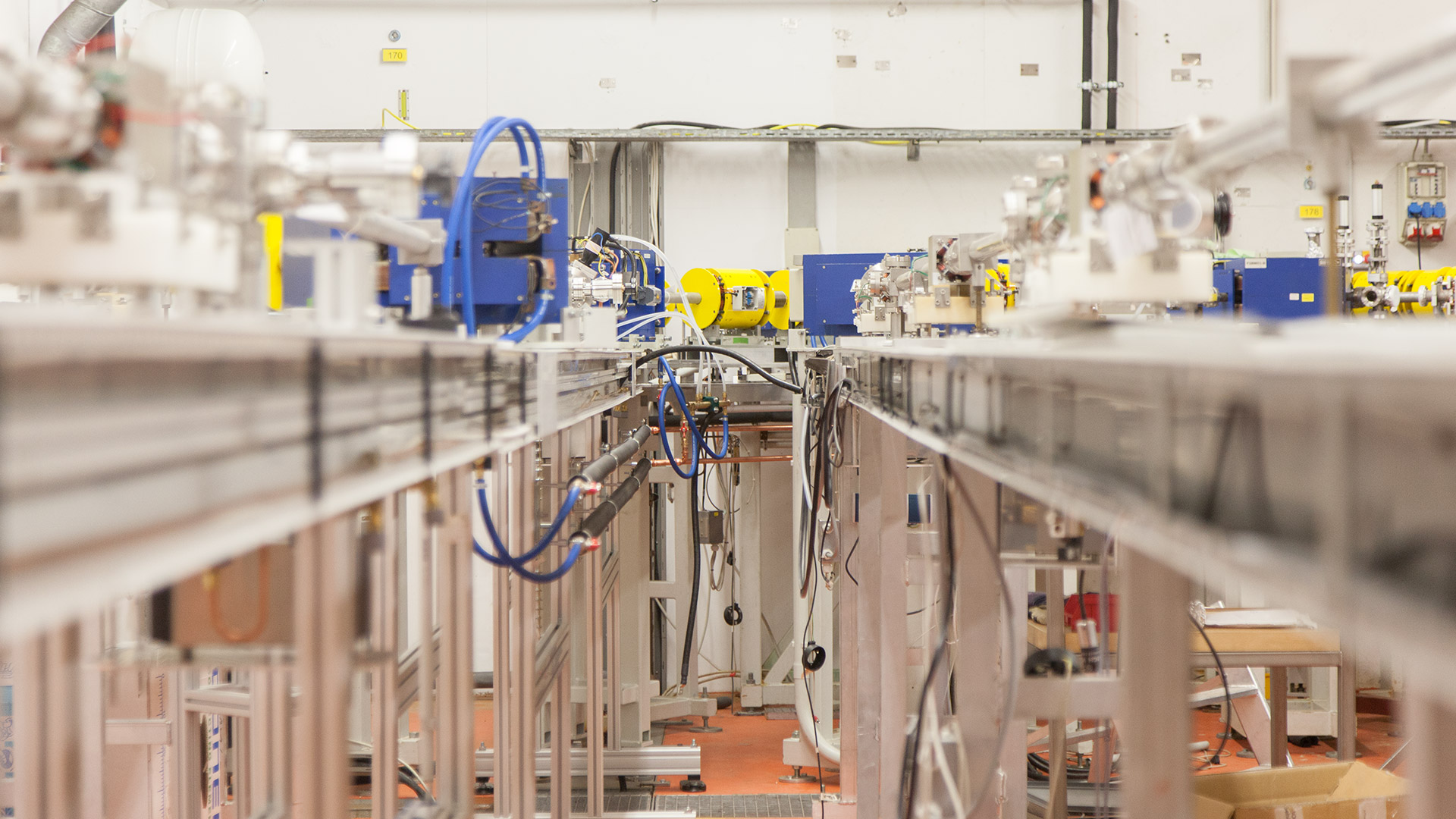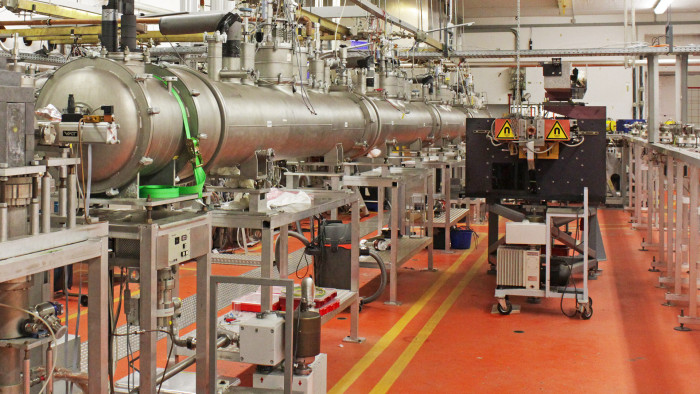Climate Research: ‘Empirical Transport Time Scales in the Tropopause Region’
Vera Bense tracks the course of the HALO high-altitude research aircraft live on her laptop. The meteorology graduate points to the screen: “At present, it is just passing over Tenerife”. In three days, the HALO plane will be arriving in Tierra del Fuego in the far south of Argentina. Then a complex measurement project will be initiated which will provide more information on the atmospheric processes in the southern hemisphere.
What is of specific interest in this context is the tropopause region, the transition zone between the troposphere, where weather events originate, and the more stable stratosphere located above it. The processes that occur here have a direct effect on the climate. Both Prof. Peter Hoor of the Institute of Atmospheric Physics at Johannes Gutenberg University Mainz and Prof. Andreas Engel of the Institute for Atmospheric and Environmental Sciences at Goethe University Frankfurt have been undertaking research in this field for many years. They have joined together for this project, entitled ‘Empirical Transport Time Scales in the Tropopause Region’, which is being sponsored by the RMU Initiative Funding for Research.
“Our two research teams complement each other perfectly,” says Bense. “The Frankfurt group focuses on measuring levels of the trace gas sulfur hexafluoride, while we in Mainz are more interested in carbon dioxide.” It is necessary to determine the concentrations of both gases in order to understand the processes in the tropopause region. Data is already available for the northern hemisphere but this is lacking to a large extent for the southern hemisphere. That is now set to change. The two universities are cooperating within a larger consortium of other partners all of whom are working towards better understanding the role played by the tropopause region in the Earth’s climate system.
Master’s degree program: Children’s Literature/Book Studies
“The Department for Children’s and Young Adult Literature at Goethe University Frankfurt and the Department of Book Studies at Johannes Gutenberg University Mainz are already leading lights in this discipline,” points out Prof. Ute Dettmar. “Now we have come together to offer a joint degree course. Thanks to the close proximity of both universities we can provide something really unique.” The new joint Master’s degree program will be launched shortly, and for the just 20 available places 55 applications have already been submitted originating from all over Germany and even from abroad. “We couldn’t have wished for a better start.”
Dettmar represents the Frankfurt side of the collaboration. “Our focus is on literary criticism aspects in particular. We are interested in narrative style, narrative form, and the question of how that narration is developed.” Junior Professor Corinna Norrick-Rühl, a member of the Mainz team, takes up the thread: “Whereas we look, among other things, at the financial side of book publishing and the media market.” Common to both teams are their close contacts with the world of practice and the local publishing world.
“As part of this unique collaboration, we will also be undertaking new research,” announces Dettmar. This will also go beyond subject boundaries, as interdisciplinarity is an important feature of the course program. “We don’t want to simply offer activities at two locations, but create common formats,” concludes Norrick-Rühl. “A monitoring system will also be in place to enable us to fine-tune and take new insights into account.”
For a practical course in Medical Technology: A robotic operating room assistant
The articulated robotic arm tirelessly and precisely pricks a hollow needle into the soft pad in front of it. “This robot was created by a 3D printer, which means we only needed to buy a few additional parts,” says Prof. Mario Kupnik, who heads up the Measurement and Sensor Technology Group at Technische Universität Darmstadt. Felix Herbst is a student of Electrical Engineering who constructed the robotic operating room assistant as part of his Bachelor thesis. One of the requirements was that it had to be inexpensive, a prerequisite that Herbst has managed to meet. It actually costs only €600 to produce.
“This robot will not be for everyday clinical use, but will be employed in the context of our recently created ‘Practical Course in Medical Technology’”, says Kupnik. The concept for this innovative course was developed as a result of the introduction of a joint study course in Medical Technology offered by TU Darmstadt and Goethe University Frankfurt. “It was clear to us that in this context it is particularly important to provide our students with practical insight into the use of medical robots.” In the coming years, students of Electrical and Mechanical Engineering will also be able to attend the practical course. The course scenario - automated needle insertion - will give them the opportunity to program and work with a number of robots in small groups.
“We in Darmstadt are contributing our technical know-how to the project,” states Kupnik. The medical aspects of the project are being handled by Prof. Thomas J. Vogl, Director of the Institute of Interventional Radiology at Frankfurt University Medical Center. The collaborative project is being sponsored by the RMU Initiative Funding for Teaching.
AccellencE Research Training Group: Accelerator Science and Technology for Energy-Recovery Linacs
Darmstadt is home to the first energy recovery linac (ERL) in Germany, the S-DALINAC electron accelerator. In Mainz, planning and development is underway for a further ERL for the PRISMA+ Cluster of Excellence. The MESA accelerator will begin operation in 2023. “This is a unique set of circumstances for our doctoral students,” declares Prof. Norbert Pietralla of the Institute of Nuclear Physics at Technische Universität Darmstadt. “At our facility they can learn and familiarize themselves with an existing ERL. At the same time they’ll also be able to contribute their own input to the development of the new ERL in Mainz and follow its construction. You can’t get a more rounded approach than that.”
Since 2016, the German Research Foundation (DFG) has financed the AccellencE 2128 Research Training Group, which is a joint undertaking of the Nuclear Physics institutes at Technische Universität Darmstadt and Johannes Gutenberg University Mainz. The focus, therefore, will be entirely on the new ERL, a device that has yet to be fully researched. These particle accelerators work particularly efficiently because they recover a large portion of the energy used to accelerate the particles. In other words, while standard accelerators simply fire particles at a target, an ERL is able to recycle many of them. For example, where one gigawatt of energy would normally be needed for a particular operation, one megawatt would be sufficient in the case of an ERL.
“Our institutes of higher education in Mainz and Darmstadt already have outstanding expertise when it comes to energy recovery electron accelerators,” says Pietralla, “and our young researchers can profit from that.” The research training group, he argues, is helping shape the next generation of experts in an important future technology.
Africans in the Rhine-Main Region: Linguistic integration research project
Earlier this year, the Institute of African Studies at Goethe University Frankfurt and the Institute of Ethnology and African Studies at Johannes Gutenberg University Mainz launched a joint research project entitled ‘Africans in the Rhine-Main Region’. It is designed to investigate linguistic integration - and discover how people who originate from Africa or have an African heritage learn the German language. The aim of the project is also to identify the strategies they employ in this context and what language learning means to them while, at the same time, also of interest is finding out what happens with the languages these individuals bring with them.
“This is a genuine pioneering project, as nothing comparable has ever been done before,” emphasizes Dr. Sabine Littig of Johannes Gutenberg University Mainz. ‘Africans in the Rhine-Main Region’ is being financed by the RMU Initiative Funding for Research. The project coordinators are Prof. Axel Fleisch in Frankfurt and Junior Professor Nico Nassenstein in Mainz. The implementation of the project is largely the responsibility of Littig and her Frankfurt colleague Dr. Klaudia Dombrowsky-Hahn. They combine various methodological approaches in order to investigate conceptions of language and communicative practices. It would appear that African people more readily learn languages through informal processes that take place outside the classroom and language courses. There has so far been very little academic research into this spontaneous form of language learning, although it seems to be highly effective.
“Most of those questioned were remarkably multilingual,” Littig said of the project’s early findings. It also became apparent that in acquiring everyday speech, different cognitive processes come into play that differ from those involved in learning German in a formal course. However, the findings are as yet tentative as the project has only just been launched.








